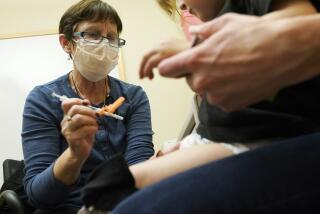Zoloft appears to work for children, with no major side effects
- Share via
Use of antidepressants in children and adolescents surged in the last decade despite a dearth of information on the drugs’ safety and effectiveness in kids.
That pool of knowledge is now beginning to grow. A study in last week’s Journal of the American Medical Assn. found that 69% of depressed children taking the drug sertraline, a selective serotonin reuptake inhibitor sold under the name Zoloft, responded well to the drug and without major side effects.
The study of 376 kids -- the largest randomized, controlled trial comparing an SSRI in kids to a placebo -- could lead to formal labeling describing Zoloft as safe for children and teens.
The manufacturer, Pfizer Inc., undertook the study at the request of the Food and Drug Administration, part of the FDA’s drive to test drugs approved for adults but widely used for children.
An estimated 3% of children and 8% of teens have major depressive disorder. Although cognitive and family therapy can be helpful in treating the condition, doctors have increasingly turned to SSRIs for their young patients. A government study last year found that use of the drugs had increased 62% in people under age 20 from 1995 to 1999.
“It’s usually the case that medications are first studied in adults. It can be years before they are studied in children,” said Dr. Karen Dineen Wagner, lead author of the JAMA study and director of child and adolescent psychiatry at the University of Texas Medical Branch in Galveston. “Yet children are suffering from these same disorders and need treatment. So many clinicians prescribe these medications that they know are safe and effective in adults.”
Zoloft is the second SSRI to be closely examined in children and adolescents. Earlier this year, the FDA approved Prozac (the generic name is fluoxetine) for children and teens.
Results of the Zoloft study, which took place at 53 clinics in the United States and elsewhere, are noteworthy because of how rapidly children and teens responded, Wagner said. Many showed a decrease in symptoms -- such as irritability, excessive crying and low self-esteem -- after three weeks.
“These children had been depressed for a very long period of time, nearly two years on average,” Wagner said. “Within three weeks, a large percentage started to have a significant reduction of their symptoms.”
In the placebo group, 59% of the patients improved, also an impressive response. Wagner said they may have responded to the increased medical attention while participating in the study. Moreover, about 20% of the placebo group participants had received, or were receiving, psychotherapy.
The high rate of improvement in the placebo group points to the importance of treating children and teens with non-drug therapies, says Dr. Bruce W. Spring, an assistant professor of clinical psychiatry at the Keck School of Medicine at USC.
“Adolescents, in particular, are developing identities and learning to handle their lives and their feelings,” Spring said. “If we pay attention to those things, there may be less of a need for medication.”
Fears that SSRIs could increase the risk of suicide in children and teens surfaced earlier this year based on European data on the drug Paxil. In June, the FDA recommended that Paxil not be used in children and adolescents with major depressive disorder while the agency investigates the issue.
In Wagner’s study, however, the number of suicide attempts was the same in both the Zoloft and placebo groups -- two in each. Three participants in the Zoloft group reported thinking about suicide compared with none in the placebo group.
Experts caution that many more studies, particularly long-term research, are needed on antidepressants and children. Still unknown is how particular antidepressants affect weight gain and overall growth and development, for example.
“We need more studies on the very long-term effects,” Wagner said. But “to me, the risks of untreated depression far outweigh the side effects of treatment.”






